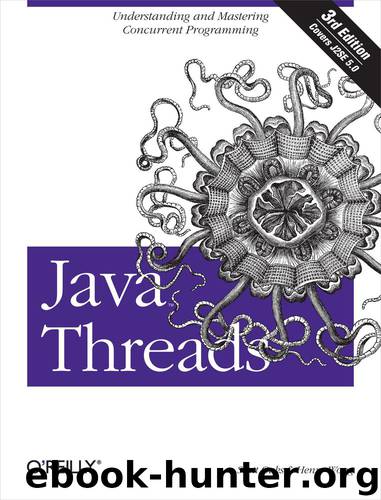Java Threads by Scott Oaks

Author:Scott Oaks [Scott Oaks and Henry Wong]
Language: eng
Format: epub
Tags: COMPUTERS / General
ISBN: 9781449366667
Publisher: O'Reilly Media
Published: 2009-06-30T04:00:00+00:00
Priority-Based Scheduling
In each of these examples, multiple threads compete for time on the CPU. When multiple threads want to execute, it is up to the underlying operating system to determine which of those threads are placed on a CPU. Java programs can influence that decision in some ways, but the decision is ultimately up to the operating system.
A Java virtual machine is required to implement a preemptive, priority-based scheduler among its various threads. This means that each thread in a Java program is assigned a certain priority, a positive integer that falls within a well-defined range. This priority can be changed by the developer. The Java virtual machine never changes the priority of a thread, even if the thread has been running for a certain period of time.
The priority value is important because the contract between the Java virtual machine and the underlying operating system is that the operating system must generally choose to run the Java thread with the highest priority. That’s what we mean when we say that Java implements a priority-based scheduler. This scheduler is implemented in a preemptive fashion, meaning that when a higher-priority thread comes along, that thread interrupts (preempts) whatever lower-priority thread is running at the time. The contract with the operating system, however, is not absolute, which means that the operating system can sometimes choose to run a lower-priority thread.
Java’s requirement for a priority-based, preemptive scheduling mechanism maps well to many operating systems. Solaris, the various Windows operating systems, Linux, and most other operating systems on desktop computers and servers all provide the support for that kind of thread scheduling. Certain operating systems, particularly those on specialized devices and on smaller, handheld devices, do not provide that level of scheduling support; Java virtual machine implementations for those operating systems must perform the necessary thread scheduling on their own.
Our first example, where the threads all complete at about the same time, is executed on a standard operating system (Solaris) where the thread scheduling is handled by the operating system. Our second example, where the threads run sequentially, is from a system where the Java virtual machine itself handles the thread scheduling. Both implementations are valid Java virtual machines.
Download
This site does not store any files on its server. We only index and link to content provided by other sites. Please contact the content providers to delete copyright contents if any and email us, we'll remove relevant links or contents immediately.
The Mikado Method by Ola Ellnestam Daniel Brolund(23444)
Hello! Python by Anthony Briggs(22579)
Secrets of the JavaScript Ninja by John Resig Bear Bibeault(21369)
Kotlin in Action by Dmitry Jemerov(20427)
The Well-Grounded Java Developer by Benjamin J. Evans Martijn Verburg(20264)
OCA Java SE 8 Programmer I Certification Guide by Mala Gupta(19440)
Algorithms of the Intelligent Web by Haralambos Marmanis;Dmitry Babenko(18250)
Grails in Action by Glen Smith Peter Ledbrook(17374)
Sass and Compass in Action by Wynn Netherland Nathan Weizenbaum Chris Eppstein Brandon Mathis(14803)
Test-Driven iOS Development with Swift 4 by Dominik Hauser(11206)
Windows APT Warfare by Sheng-Hao Ma(7854)
Layered Design for Ruby on Rails Applications by Vladimir Dementyev(7568)
Blueprints Visual Scripting for Unreal Engine 5 - Third Edition by Marcos Romero & Brenden Sewell(7475)
Solidity Programming Essentials by Ritesh Modi(4589)
Functional Programming in JavaScript by Mantyla Dan(4552)
Hands-On Full-Stack Web Development with GraphQL and React by Sebastian Grebe(4449)
WordPress Plugin Development Cookbook by Yannick Lefebvre(4419)
Ember.js in Action by Joachim Haagen Skeie(4310)
Unity 3D Game Development by Anthony Davis & Travis Baptiste & Russell Craig & Ryan Stunkel(4283)
